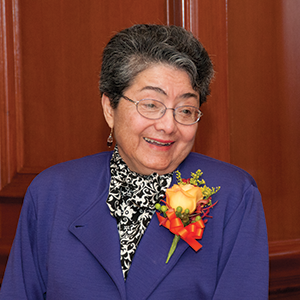As a pathologist, Yolanda C. Oertel, M.D., RESD ’72, always tried to practice medicine using both her head and her heart. Over a career spanning more than three decades, her two-pronged approach bore the stamp of medical humanities — the interdisciplinary field that applies humanities, the arts, and social sciences to medicine — a fact Oertel believes always made her a better pathologist. “As physicians we have the brainpower, but we have to remember that we also have a heart and it needs to be nourished by the arts and humanities,” she says.

Yolanda and her husband James E. Oertel, M.D., who passed away on Dec. 5, 2013, donated $2.5 million to the GW School of Medicine and Health Sciences (SMHS) to establish the Yolanda and James Oertel Professorship for the Medical Humanities. The couple hoped that an endowed professorship would help incorporate the study of medical humanities into medical education and give students and physicians the opportunity to gain a deeper understanding of the human condition and improve their clinical skills.
“Endowed professorships are among the highest form of honor and recognition in academic medicine,” says Jeffrey S. Akman, M.D. ’81, RESD ’85, Walter A. Bloedorn Professor of Administrative Medicine, vice president for Health Affairs, and dean of SMHS. “Dr. Oertel is a renowned physician who exemplifies ‘whole person’ care. Her gift will support the recruitment and retention of the best and brightest physicians and professors.”
The training Oertel received at SMHS has greatly contributed to her success in the field of pathology. “I feel it’s my duty to give back in a way that allows future physicians to have the same opportunities and experiences I did,” she says.
“As physicians we have the brainpower, but we have to remember that we also have a heart and it needs to be nourished by the arts and humanities.” —Yolanda C. Oertel, M.D., RESD ’72
As a pathology resident, Oertel was influenced and impressed by the diagnostic ability of William Newman, M.D., former director of anatomic pathology and professor of pathology at SMHS. She describes Newman, a mentor and friend, as an excellent physician who treated his patients with respect and compassion. “He empathized with his patients,” recalls Oertel. “He would say, ‘You have to consider the patient in every decision you make as a physician.’” In anatomic pathology, she explains, physicians spend their time examining tissue sections under a microscope; as a result they can sometimes lose sight of what they’re looking at. Newman, she says, always reinforced the fact that on that slide is part of a human being.
Medical humanities seeks to provide a greater understanding of the human condition. Attention to literature and the arts helps clinicians develop and nurture their skills of observation, analysis, and empathy. Oertel says her medical career has been greatly influenced by the arts and her love of reading and music.
The field of medicine is constantly evolving, but one thing will never change, according to Oertel. “We exist to serve the patient. We have to make the patient part of every diagnostic decision we make as physicians,” she adds.
The Oertels’ gift will endow the Professor and Director of the SMHS Medical Humanities Program, which will be the first commitment for a named professorship in this discipline at the school.
“I think the role of humanities and art in medical education is finally being appreciated and really understood in today’s medical arena,” Oertel says, “and I think GW is at the forefront of this movement.”



